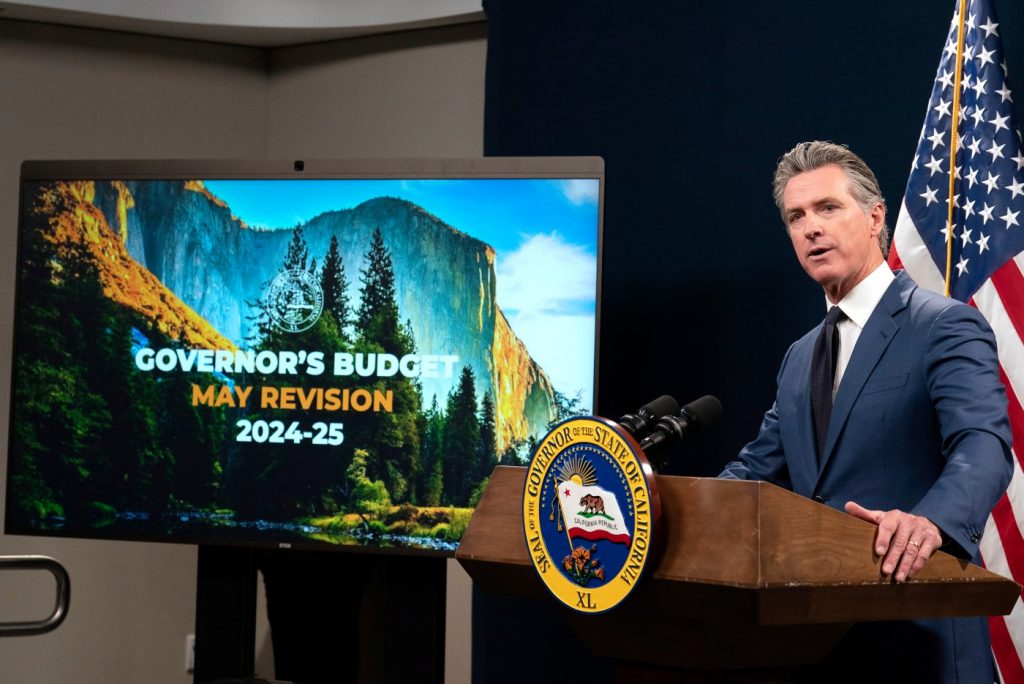Just minutes after Gov. Gavin Newsom unveiled a revised state budget with billions of dollars in spending reductions on Friday, advocates for affected programs began showering reporters with statements of dismay.
The gist of the complaints was that after Newsom and the Legislature had devoted attention and money to expanded health care coverage, prekindergarten education, income supports for the poor, undocumented immigrant assistance, homelessness, climate change and a myriad other left-of-center causes, the new budget would punish their recipients.
Building the California Dream Alliance, a consortium of nearly 60 groups, was among those disappointed with Newsom’s budget, issuing a compendium of comments from its members, including the Western Center on Law and Poverty.
“Although we appreciate the governor maintaining previous expansions and grants, his approach balances the budget on the backs of low-income Californians through over $3 billion in cuts,” Linda Nguy, an associate director of the organization, said. “Instead of considering additional revenue solutions, the governor proposes to cut in-home supportive services for people who were previously excluded from Medi-Cal due to their immigration status, deeper CalWORKs cuts, and continued cuts to housing and homelessness prevention programs.”
The League of California Cities, which has been sparring with Newsom over money to reduce homelessness, declared that Newsom’s budget “will hurt those already most vulnerable in our communities: the unhoused, those who are one paycheck, eviction, or natural disaster away from homelessness, and those struggling to find safe and affordable housing.”
While Newsom’s first budget proposal, issued in January, minimized spending reductions and relied mostly on emergency reserves, deferrals and accounting gimmicks to close what he said was a $38 billion deficit, this month’s revision raised the deficit to $44.9 billion in 2024-25 and projected another $28.4 billion gap in 2025-26.
Given those numbers, Newsom was forced — albeit reluctantly — to make some real spending cuts totaling nearly $34 billion over two years, almost half of the projected deficits.
“These are propositions that I’ve long advanced, many of them. These are things that I’ve supported,” Newsom said. “But you’ve got to do it. We have to be responsible. We have to be accountable. We have to balance the budget.”
As if to punctuate his position, Newsom’s Department of Finance issued a nine-page summary of more than 250 specific reductions for the two fiscal years.
It’s evident that many affected groups would, like the Western Center on Law and Poverty, prefer that Newsom seek tax increases to cover the state’s deficits. Although the budget does contain some direct and indirect tax increases on corporations and health care providers, they would have only marginal effects on the deficit and Newsom for the umpteenth time declared opposition to any general tax hikes.
“There are no new taxes. I’ve not been one of those promoting taxes,” the governor said, adding later, “No, I’m not prepared to increase taxes.”
Related Articles
Opinion: Climate change won’t wait for better budget years. Californians need climate bonds now
Walters: Newsom aligns with gloomier budget outlook, blames ‘massive volatility’
Newsom says state has $27 billion budget shortfall, but it can be balanced without raising taxes
Opinion: California’s budget can’t afford to maintain empty prison beds
Walters: Lagging revenue continues to drive California budget deficit
Newsom is in his final term as governor and thus is insulated from negative reaction to his spending cuts or opposition to taxes in California. He is, however, trying to expand his national political profile and drifting rightward might help him in that endeavor.
Democratic legislators, on the other hand, must worry about voter backlash and have close ties to unions and other groups disappointed with the budget. Many would prefer to raise taxes or use more reserve funds rather than make the spending cuts that Newsom wants.
Underscoring the political tension is the worrisome possibility — or perhaps probability — that deficits in recent and future budgets are not just blips, but imply that California now has a “structural deficit” with a fundamental mismatch of income and outgo.
Dan Walters is a CalMatters columnist.


